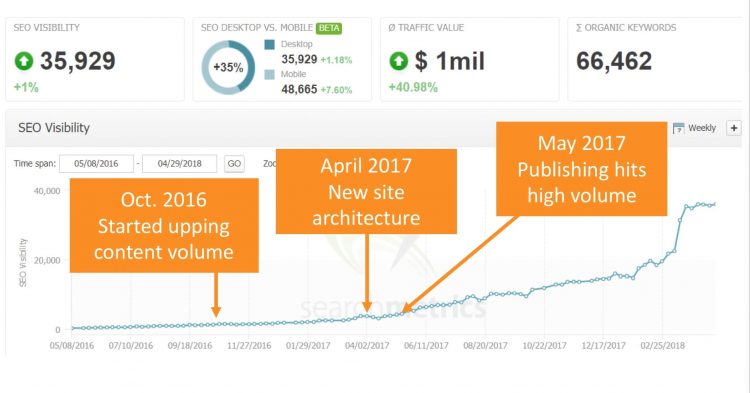Is Mark actually going to attempt a trust fall again? Will Eric catch him this time? You’ll have to watch to find out! In the meantime, let’s talk about why trust is essential to your SEO.
In this episode of our popular Here’s Why digital marketing video series, Eric Enge explains the importance of building trust with both search users and Google itself, and why that matters to your search performance.
Don’t miss a single episode of Here’s Why with Mark & Eric. Click the subscribe button below to be notified via email each time a new video is published.
Resources
- Eric’s keynote on trust-centric SEO from our Next10x conference
- See all of our Here’s Why Videos | Subscribe to our YouTube Channel
Transcript
Mark: Eric, I know people used to speculate that search engines had a sort of trust rank rating that factored in the search rankings, but Google denied they had any such factor. So why are you talking about trust-centric marketing for SEO?
Eric: Because I know what Google wants.
Mark: You do? And what is that?
Eric: Well, to make money.
Mark: Oh, well, duh. But what does that have to do with why we should strive to build trust for our brands in SEO?
Eric: Okay. When I say that Google wants to make money, what I mean is, like any business, they’re going to optimize for the things that make them the most money.
Mark: Sure.
Eric: But in Google’s case, far and away the biggest revenue generator for them is the ads that they run within search.
Mark: So they’re going to optimize for things that keep people on search and keep them coming back to see those ads.
Eric: Exactly.
Mark: What are some of the things Google optimizes for in order to do that?
Eric: Google has a long-term view of how to preserve market share and ensure the best revenue growth for the long-term. So, with that in mind, some of the things that they optimize for are the overall performance of each page, by which I mean they’re not caring so much about how each individual search result performs but the page as a whole.
Mark: The search result page?
Eric: Correct. And then user satisfaction is clearly a big deal. That’s part of how they measure the performance.
The net revenue per page matters, of course. But long-term market share is a really big piece of the puzzle. It’s really important for them. So the bottom line is that Google thrives when they give people what they want because that’s what enables all those things to happen.
Let me explain how that likely impacts what Google does with machine learning and artificial intelligence. What they’re trying to do is optimize all those factors. One of the things that we’ve seen is that they’re focusing a lot of energy on improving and understanding what a user’s actual intent is with a search query when they enter it in. And based on seeing that intent, better matching up with content.
That actually helps them both with user satisfaction and long-term market share, and fits into the fact that they have plenty of data that shows them that higher satisfaction with search results actually gives more revenue even in the short term.
What I’ve found with the senior SEO people that I speak to on a regular basis is that user experience and these things are becoming increasing ranking factors, along with satisfaction with the overall user experience. What we don’t know right now is exactly how that’s measured.
Mark: So any evidence that you’ve seen of all of that you’re talking about?
Eric: I referred to it already. Consider the March SEO updates, where they really look at overall user intent and did a better job of matching up user’s queries with the right content.
But one of the cool things, as you see in this chart, is that we’ve seen some sites that have invested extremely heavily in content that have seen explosive growth.

What I’m drawing out of that is that the sites have shown that not only do they have great depth of content, but a really great breadth of content. So they’re addressing a very large percentage of user needs related to their topic area, and Google is eating it up.
Mark: What should we do specifically to align ourselves with what Google wants?
Eric: I like always to give people some intuition on how to think about things.
The first thing is, if you become the answer that users want, then you actually become the answer that Google wants. Over time, this will pay off for you. That starts with creating high-quality content–lots of informational content–not just selling your stuff.
Also offering a great user experience, obviously, because even if you have great content, if the user doesn’t find it, it’s not going to help you.
Getting links still matters, and mentions matter because those are signals that people are endorsing and buying into your content. How do you get those? More great content. So all this fits together.
In addition, think about task completion when users come to your page. Imagine you have an eCommerce page and you’re selling something; let’s say rowboat oars. Somebody lands on your oars page. Of course, you want to sell them oars, but what else do they want, right? There are other things that they probably have in their mind at the moment; for example, oar locks might be something they want. They might need something else for their rowboat. Of course, they need various purchase options and things like that.
So this is really all part of the mix that you need to consider to offer a more complete experience to users. Those are the kinds of scenarios that we’re talking about.
Don’t miss a single episode of Here’s Why with Mark & Eric. Click the subscribe button below to be notified via email each time a new video is published.
See all of our Here’s Why Videos | Subscribe to our YouTube Channel

